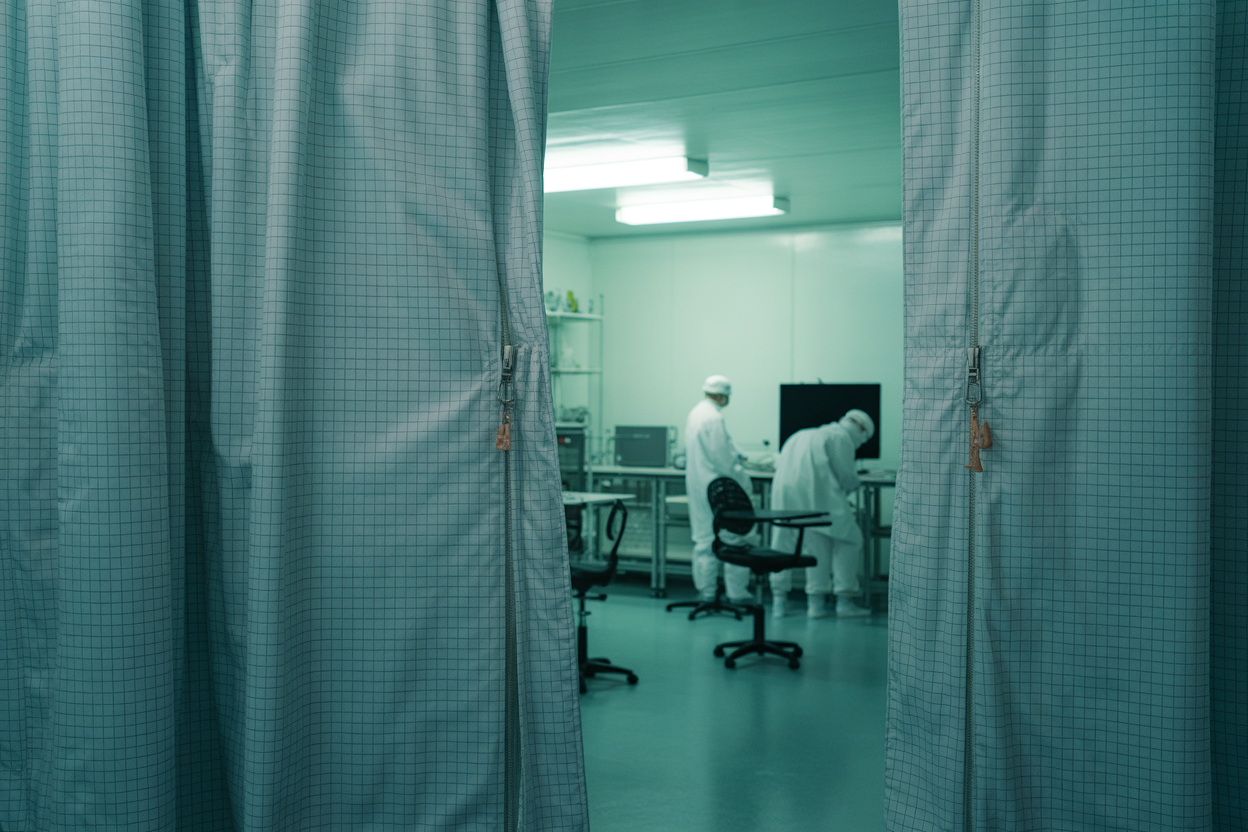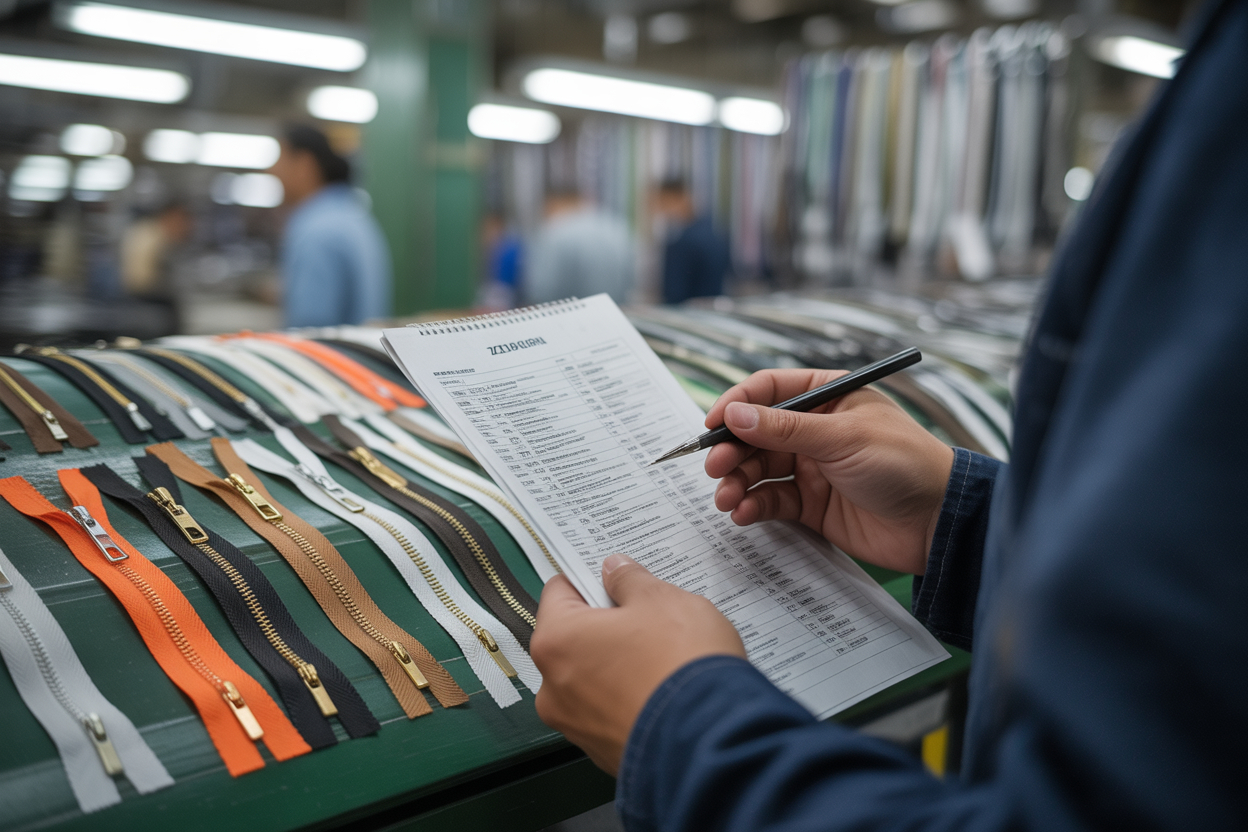Modern industrial environments depend on flexible barriers more than ever before. Whether dividing production zones, containing airborne particulates, or creating temperature-controlled enclosures, the performance of an industrial curtain often hinges on one overlooked component—the zipper.
A barrier’s fabric may resist chemicals, heat, and abrasion, but its closure determines usability, cleanliness, and lifecycle. That’s why OEMs and fabricators across North America partner with LenZip for high-strength, smooth-operating zipper systems tailored specifically for heavy-duty curtains and vinyl partitions.
From manufacturing cells and welding booths to medical cleanrooms and warehouse docks, LenZip’s closures deliver proven reliability where constant motion and contamination control meet.
The Hidden Load on Every Curtain Zipper
Industrial partitions are dynamic structures. A single curtain panel may be opened and closed dozens of times per shift while enduring constant tension, vibration, and environmental changes. Each cycle stresses the chain, slider, and tape. Add airborne dust, lubricants, and temperature swings, and lesser zippers quickly deform or seize.
A failed closure isn’t just inconvenient—it can compromise cleanroom certification, waste conditioned air, or expose workers to welding fumes or overspray.
LenZip’s engineering team designs each industrial curtain zipper as a mechanical component, not a textile accessory. Every tooth pitch, tape weave, and slider interface is optimized to carry load and maintain alignment under continuous use.
Because all production occurs in the company’s Chicago-based facility, process control ensures uniform tolerances across thousands of feet of chain, eliminating the dimensional drift that plagues imported alternatives.
Material Science Behind Heavy-Duty Performance
The key to curtain longevity lies in the interplay of base fabric and closure. LenZip builds its industrial-grade zippers on solution-dyed polyester tapes renowned for tensile strength and chemical stability.
Polyester resists stretching even when suspended under the full weight of a multi-panel vinyl barrier. Unlike cotton or nylon, it absorbs minimal moisture, preventing swelling that can jam sliders in humid plants.
For curtains exposed to solvents or oils, LenZip applies protective polyurethane coatings that shed residue and allow easy wipe-down. In wash-down or cleanroom applications, thermoplastic polyurethane (TPU) coatings deliver a slick, non-porous surface compatible with disinfectants and steam cleaning.
The teeth themselves may be molded acetal resin or co-extruded polyester-Delrin® hybrids, materials that balance rigidity with flexibility. These resins maintain bite strength across temperature extremes and resist embrittlement from ultraviolet exposure around dock doors or outdoor partitions.
To protect metallic components from oxidation, LenZip offers stainless-steel sliders and nickel-free finishes validated through ASTM B117 corrosion testing.
Each finish option is detailed in the company’s Zipper Materials & Finishes Guide for precise OEM specification.
Smooth Operation Under Stress
A curtain zipper must move freely despite side-loads from hanging weight and wind pressure. LenZip addresses this through precision tooth geometry and low-friction coatings that keep sliders gliding evenly along wide spans.
In production environments, workers wearing gloves need tactile, reliable pulls; LenZip’s oversized grip tabs and double-slider configurations accommodate two-way access without misalignment. The result is a closure that opens effortlessly yet locks tight against drafts or airborne particles when sealed.
Learn more about zipper slider design and operation.

Cleanroom and Controlled-Environment Applications
Cleanroom curtains demand more than strength—they demand cleanliness at the molecular level. Any surface irregularity can harbor dust or microorganisms.
Lenzip’s TPU-coated zippers feature smooth, weldable edges that integrate seamlessly into clear vinyl or antistatic PVC panels without stitched seams. Because TPU and vinyl share similar polymer chemistry, the zipper tape can be RF-welded or heat-sealed directly into the curtain panel, eliminating needle holes that would otherwise leak or shed fibers.
This design helps facilities maintain ISO Class 7 and 8 standards while allowing modular reconfiguration as equipment layouts change.
Medical and pharmaceutical manufacturers also benefit from the non-corrosive and sterilization-safe properties of LenZip’s polymer hardware. Sliders and stops can withstand alcohol and chlorine wipes without pitting or discoloration.
When installed with overlapping flaps or clear vinyl shields, these zippers form effective barriers against airborne contamination, a feature validated in multiple FDA-audited facilities using LenZip components.
See also Antimicrobial Zippers for Medical, Food & Cleanroom Applications for related hygiene solutions.
Welding Booths and Safety Enclosures
In fabrication shops, zipper performance affects both safety and productivity. Welding curtains and grinding booths must contain sparks, spatter, and fumes while allowing quick operator access.
LenZip’s high-temperature polymer chains and self-extinguishing polyester tapes prevent melting or dripping if briefly exposed to sparks. Their consistent tooth engagement resists impact shock from hanging panels that sway with ventilation drafts or forklift traffic.
Unlike metal zippers that can arc or corrode, these polymer systems provide non-conductive safety and long service life in rugged conditions.
Learn more about fire-resistant zipper solutions engineered for PPE and high-heat environments.
Warehouse and Temperature-Control Barriers
Temperature loss at loading docks can cost thousands in energy waste each year. Zippered curtain doors provide a simple, flexible alternative to rigid panels, but only if the closure seals properly.
LenZip’s heavy-gauge molded-tooth chains compress tightly along the full height of the partition, minimizing air exchange between climate zones. Combined with magnet or Velcro side flaps, they create a continuous thermal barrier that withstands forklift traffic and constant flexing.
Polyurethane-coated tapes retain pliability in cold storage areas down to –40 °F and resist cracking when repeatedly flexed near freezer thresholds.
For facilities requiring both insulation and transparency, LenZip pairs clear-vinyl curtain materials with color-coded polymer zippers to differentiate zones. OEM curtain fabricators can source these assemblies pre-cut or on continuous chain rolls through LenZip’s Custom Zipper Solutions Program.
Design Integration for OEM Curtain Manufacturers
Every curtain project poses unique mechanical challenges—panel weight, mounting style, airflow, and cleaning method. LenZip’s engineering team collaborates early in design to specify correct gauge, tape width, and slider type.
For ceiling-hung systems, lighter coil chains reduce stress on support tracks while maintaining closure integrity. For large industrial partitions exceeding 20 feet in height, LenZip recommends reinforced bottom stops and double-row stitching patterns verified in the Zipper Testing Standards Resource.
Because the company extrudes, molds, and coats its components in-house, OEMs can request proprietary color matches, antimicrobial additives, or fire-retardant finishes meeting NFPA 701. These options simplify compliance with building and safety codes while keeping visual branding consistent across a facility.
Explore more about zipper material testing and finishes for industrial products.

Ease of Maintenance and Longevity
Curtains operate in dirty, abrasive environments. Metal shavings, dust, and overspray inevitably find their way into closures. Routine cleaning is essential to preserve smooth action.
LenZip advises wiping chains with mild detergent and water, then applying a thin film of dry silicone lubricant—procedures detailed in the Maintenance & Care Guide.
Because the tapes and coatings resist most industrial chemicals, workers can sanitize zippers during standard curtain cleaning cycles without degradation.
Field experience shows that LenZip’s heavy-duty assemblies outlast conventional imports by two to three times, thanks to consistent pitch alignment and reinforced slider housings. Replacement parts remain available for long-term service, protecting OEMs from obsolescence.
Acoustic and Dust-Control Applications
In manufacturing environments where noise reduction or particulate control is critical, zippers often mark the weakest link in barrier performance.
LenZip’s tight-interlock coil chains reduce sound transmission and particle migration by eliminating micro-gaps along the closure. When used with multi-layer vinyl or quilted acoustic panels, these zippers preserve sound-attenuation ratings and minimize maintenance of sensitive equipment.
They are particularly valued in aerospace assembly areas, electronics plants, and research labs where cross-contamination can jeopardize precision processes.
Sustainability and Energy Efficiency
Energy efficiency is now a top priority for facility managers. Properly sealed industrial curtains equipped with precision zippers reduce heating and cooling losses while allowing flexible space division.
LenZip’s domestically produced zippers also support sustainability goals by shortening supply chains and cutting international freight emissions.
The use of recyclable thermoplastics in tapes and teeth aligns with corporate ESG targets and contributes to circular manufacturing initiatives outlined in Eco-Engineered Zippers.
Learn how LenZip’s U.S. manufacturing practices support environmental responsibility.
Compliance and Traceability
Each zipper leaving LenZip’s facility carries a unique lot number linking it to its resin batch, coating formula, and testing data. All materials are REACH- and RoHS-compliant, and optional FDA-grade coatings meet incidental-contact requirements for food or pharmaceutical production zones.
This traceability ensures regulatory confidence and simplifies documentation for ISO 9001 audits. Clients can access full compliance records through the LenZip Resources Hub.
Why OEMs Choose LenZip for Industrial Curtain Applications
Industrial curtains might look simple, but behind every panel lies complex engineering: mechanical strength, chemical resistance, ergonomics, and cost of ownership.
LenZip brings decades of expertise in balancing these factors. As a fully U.S.-based manufacturer founded in 1946, LenZip controls its production from polymer blending through final assembly, enabling unmatched customization and lead-time reliability.
OEM partners appreciate direct access to technical staff who understand tensile testing, coatings, and RF-welding methods. That combination of science and service makes LenZip not just a supplier but an engineering collaborator.
From aerospace cleanrooms to automotive plants, food-processing lines, and warehouse partitions, LenZip zippers continue to define the standard for durability and precision.
Every chain, slider, and stop is a testament to the idea that reliability begins with control—and LenZip’s control of every process delivers performance that endures.
Learn More
For technical drawings, performance data, and sample requests, visit the LenZip Resources Hub.
To integrate custom industrial curtain zippers into your product line, request a quote and speak directly with LenZip’s engineering team.
Frequently Asked Questions
Can industrial curtain zippers be RF-welded instead of sewn?
Yes. TPU-coated LenZip tapes bond directly to vinyl or polyurethane curtains using RF energy, eliminating needle holes and maintaining cleanroom-grade seals. See the RF-Welded Integration Guide for parameters.
What materials are best for heavy-duty barrier zippers?
High-tenacity polyester tapes with PU or TPU coatings offer the best balance of strength and chemical resistance in industrial curtains.
Are LenZip zippers compatible with cleanroom standards?
Yes. Smooth TPU coatings and non-corrosive hardware meet ISO Class 7-8 cleanroom requirements and resist disinfectants and alcohol wipes.
Do these zippers resist temperature extremes?
Absolutely. They retain flexibility from –40 °F to 160 °F, ideal for freezer barriers or hot-process areas.
Can LenZip customize zippers for specific OEM curtain systems?
Completely. Chain gauge, slider type, color, and coating can be tailored through the Request a Quote Portal.
